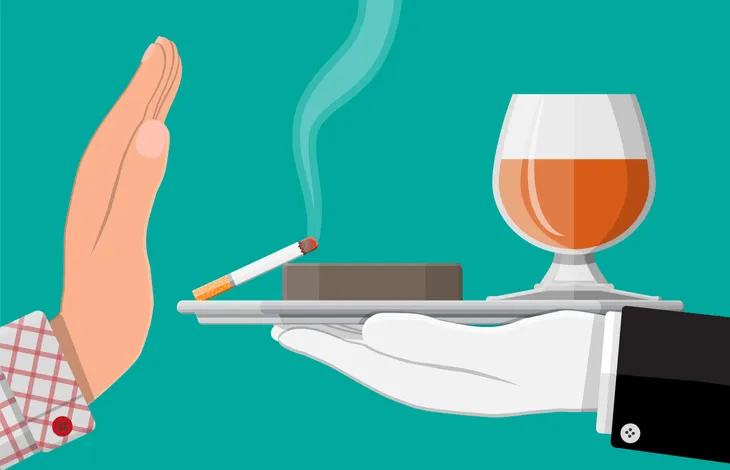People who are neat and tidy will sometimes refer to themselves as being “OCD,” but in reality, obsessive compulsive disorder is so much more than being organized. It’s a mental illness that causes obsessive thoughts and urges or compulsive, repetitive behaviors (most people have both obsessions and compulsions). Not only that, but these thoughts and behaviors are more than nail biting or worry, they can be so severe that they cause severe anxiety and according to WebMD, can have a major impact on someone’s day-to-day life.
Thankfully, this disorder can be maintained with the help of therapy and medication. It can be a lifelong condition that takes a lot of self-care and work, but it is possible. While proper treatment from a medical professional is necessary for managing OCD, there are some strategies you can try on your own to help manage your symptoms. For those who need it, we’ve compiled a list of some helpful tips on how to better deal with OCD.
Identify Your Triggers
The first step to managing OCD symptoms is to understand what your triggers are, says HelpGuide.org. These triggers could be particular thoughts or situations that are known to bring on obsessions and compulsions. “Record a list of the triggers you experience each day and the obsessions they provoke. Rate the intensity of the fear or anxiety you experienced in each situation and then the compulsions or mental strategies you used to ease your anxiety,” writes the source.
Keeping track of these triggers may help you anticipate your urges. If you can anticipate an urge, then it may help you control those compulsions before they arise. This is the key to easing the symptoms. For example, some people with OCD feel a compulsion to repeatedly check that all doors and windows are locked or appliances turned off, but if you anticipate that you might feel this urge, you may be able to take extra care to lock the door or turn off the appliance the first time, so that you don’t feel compelled to check it again.
Be Diligent with Sleep
Sleep is extremely important to our overall health, particularly our mental health. We should all make sure we get a good night’s sleep as much as possible. This would be around 7 to 8-hours of sleep a night — for some people it may be even more! Unfortunately, people with OCD tend to have a hard time sleeping due to their anxiety. On the flip side, HelpGuide.org says a lack of sleep can also make anxiety worse. The best thing to do is to try to get lots of sleep because this makes it easier to manage your emotions which is important for people with OCD.
WebMD’s advice on improving sleep is to set up a routine that will set your body up for success. Don’t expect to just lie down and magically fall asleep. You need to create a sleep routine which includes going to bed around the same time every night, eliminating screen time before bed, adjusting the temperature in your bedroom, and dimming the lights. If you still have trouble falling asleep, try listening to relaxing music before bed or taking a warm bath. It might take a few tries to find a solution that works for you.
Get Active
Exercise is great tool for coping with stress and anxiety, making it a natural and effective treatment for OCD symptoms. When a person is stressed, their body releases a hormone called cortisol. While cortisol can be helpful when it is released in small doses, too much can be harmful. “Regular exercise keeps your cortisol levels in check and benefits everything from your bones and organs to the numbers on your scale,” explains WebMD. Exercise will help refocus the mind when these obsessive thoughts and compulsions arise.
HelpGuide.org recommends getting at least 30-minutes of aerobic exercise on most days. It doesn’t have to be one big block of time. You can try tackling it in smaller intervals like 10-minutes of activity several times a day. This can be just as effective as one longer workout. Evidence shows that running is another great self-help strategy for coping with the frequency and intensity of OCD symptoms, says VeryWell Mind.
Be Consistent with Prescription Meds
As we mentioned previously, OCD is complex and sometimes difficult to treat, but it can be manageable with the right prescription medications. Your medications are prescribed to you by a doctor to help you. Use them! While this might seem like common sense, it’s important to note that taking the right medication, including the right dosage, is one of the biggest keys to successfully managing OCD. You need to be diligent with your prescription medication. Skipping a dose, even if it’s by a mistake, can have serious effects by setting off your symptoms, says WebMD.
If you don’t have medication or think you need to switch to a different medication, talk to your doctor. Don’t ever stop or start taking a medication without consulting a doctor.
Eat a Healthy Diet
When it comes to health we typically associate food with physical health, but our diet can have an impact on our mental health, as well. We should all try to eat healthy foods on a regular basis, but this is even more so important for someone who struggles with a condition like OCD. WebMD advises eating healthy foods on a regular basis because when your blood sugar drops it can make a person cranky or tired. This isn’t a good frame of mind to be in when it comes to coping and dealing with OCD.
WebMD suggests starting the day off right with a healthy, well rounded breakfast. Follow this up with smaller meals throughout the day instead of two larger meals at lunch and dinner. When deciding what foods to eat, you should include nut and seeds because they provide all kinds of healthy nutrients. Be sure to eat some kind of protein, such as eggs, beans, or meat. These kinds of foods will fuel the body slowly so that it’s better balanced. Lastly, be sure to eat complex carbs like fruits, veggies, and whole grains to maintain steady blood sugar levels.
People with OCD should try to avoid consuming caffeine which includes tea, coffee, soda and energy drinks. People with OCD struggle with heightened anxiety and caffeinated drinks will only make this worse.
Avoid Drugs and Alcohol
People with mental health issues often turn to vices like alcohol or smoking to help them cope with their symptoms, but these are actually hidden triggers. They are only temporary fixes that in actuality, make things worse, not better. “Drinking alcohol might feel like it offsets your anxiety, but it creates more before it leaves your system,” warns WebMD. “Same goes for nicotine, the stimulant in cigarettes.”
HelpGuide.org warns that smoking leads to higher levels of anxiety and OCD symptoms. So reaching for it to help lower them in any way shape or form will not work.
Learn Relaxation Techniques
Dealing with the compulsions and behaviors of OCD can cause a lot of anxiety which is why it’s extremely important for people with OCD to learn coping mechanisms that will allow them to relax. WebMD says the body can’t relax if it doesn’t know how. Some of the best techniques to learn are meditation or yoga. But it doesn’t even have to be that complicated.
You can relax by just taking a walk in nature or drawing a picture. Next time you’re feeling overwhelmed, take some time to try one of these techniques. You might find some work better than others or enjoy doing more than one!
Find a Support System
You are never alone when it comes to dealing with OCD, but finding the right support can sometimes be difficult. While the stigma on mental illness has improved by leaps and bounds in the past few years, there are still many people who believe those who struggle with mental health issues should just “snap out of it.” Thankfully, there are many different resources available, especially if you own a phone or a computer. Don’t try to handle it all on your own. Seek help. Open up to others about your struggles and build a support system with friends and family. You could also seek out support by visiting your doctor, a therapist, OCD coach, or just a support group.
According to WebMD, even something as simple as saying out loud what you’re thinking can help lower anxiety and stress. It will also help put things in perspective. Support groups or group therapy are among the best support systems for people with OCD because they provide social support and safe place for you to discuss your illness and its challenges. You will be surrounded by people who understand what you’re going through which can make a huge difference.
Reduce and Manage Stress
We all get stressed from time to time and we all have different things in life that cause us stress. Unfortunately for people who have OCD, stress is often one of the common triggers. While all of us experience stress, some people are better at handling stress than others. “Each of us has a stress bucket; some of us have deep buckets, while others have buckets that are quite shallow. The stress that you experience each day is like water being poured into the bucket, and because we all have different-sized buckets, some people’s buckets fill up more quickly than others,” writes VeryWell Mind.
With that being said, people with OCD tend to have smaller buckets, so they are more prone to an “overflow.” To better cope with the symptoms of OCD, keep an eye on how full your bucket is. When you notice it getting too full or the water level getting high, empty it out. Some productive strategies for dealing with stress would be to get a good night’s sleep, exercise, meditation, deep breathing, listening to music, eating well, or yoga.
Practice Mindfulness
You might have heard the term “mindful meditation” before. The idea of mindfulness comes from eastern spiritual traditions like Buddhism. It encourages people to have “a non-judgemental awareness of bodily sensations, sights, sounds, thoughts, and emotions,” writes VeryWell Mind. This form of meditation can help people cope with OCD symptoms.
VeryWell Mind encourages “being mindful of distressing or disturbing thoughts may act as a form of exposure to feared obsessions, similar to a person who is afraid of dogs spending time with a dog to lessen the fear.” This practice may help a person put distance between themself and their obsessive thoughts and compulsions. You will begin to realize that these are just a collection of words and images and they are nothing to fear. “This can help to reduce thought-action fusion, a psychological process that can make OCD symptoms worse.”
Try Alternative Techniques
Another piece of advice is to not be afraid of trying alternative techniques. Some people shy away from alternative medicines or techniques, but as long as they are being used as a supplement to other medication, what’s the harm in trying? There are plenty of herbal remedies that are gaining popularity in North America and Europe, particularly for anxiety. For example, VeryWell Mind suggests St. John’s Wort for anxiety.
Before going out and trying this remedy, it’s important to note that there is mixed evidence out there as to whether or not it is effective. You should also consult your doctor before trying any herbal treatments.
Celebrate Victories
It’s not easy to live with OCD. It’s a serious condition that many people struggle with. The compulsions and behaviors can consume a person’s life. If you’re struggling, seek help. While it might seem hard, it’s not impossible to live with OCD, it just takes time. WebMD assures that it’s normal to have setbacks while learning how to best cope with this condition.
Just like any other goal in life — nobody gets it right on the first try, and even if they do, it can be a lifelong struggle that you’ll be working at every day. While going through this process, don’t forget to celebrate any victories along the way, no matter how big or small they are. Every little accomplishment is important!















